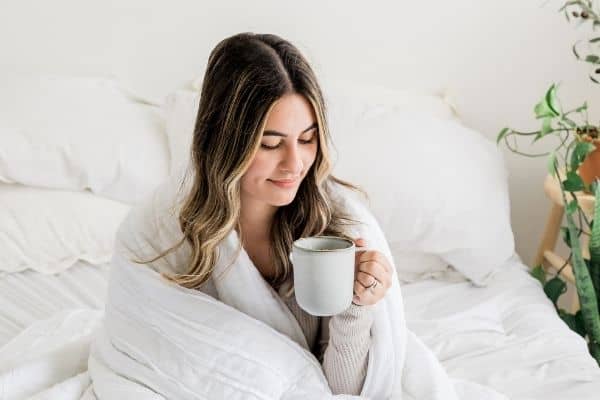
Herbal medicinal products for non‐ulcer dyspepsia. Tulsi - Ocimum sanctum: A herb for all reasons. Review article: The physiological effects and safety of peppermint oil and its efficacy in irritable bowel syndrome and other functional disorders.

The effect of lavender aromatherapy on autonomic nervous system in midlife women with insomnia. Effects of lavender tea on fatigue, depression, and maternal-infant attachment in sleep-disturbed postnatal women. Sleeping hours: What is the ideal number and how does age impact this? /labs/pmc/articles/PMC6267703/ cdc.gov/media/releases/2016/p0215-enough-sleep.html Centers for Disease Control and Prevention.Dietary supplements used in the treatment of depression, anxiety, and sleep disorders. leaf extract in the treatment of volunteers suffering from mild-to-moderate anxiety disorders and sleep disturbances. Aqueous fraction from Hibiscus sabdariffa relaxes mesenteric arteries of normotensive and hypertensive rats through calcium current reduction and possibly potassium channels modulation. If you’re still having issues, consider making an appointment with a healthcare professional. And try to make sure you’re not eaten up with stress and anxiety when your head hits the pillow - yoga or meditation may help. Do what you can to make your sleep environment as cool, dark, and quiet as possible. It may be time to call in reinforcements.Ĭonsider your overall sleep hygiene. We’ll refer you to our handy tea brewing guide for all the details, but to put it simply: Steep the tea in hot water for about 5 minutes (or longer if you like a stronger tea) and sip sip sip. Some sleepy tea makers say you can have 2 to 3 cups in the evening, but start with 1 cup before bedtime to see how it affects you. When you’re ready to get sleepy - typically 30 minutes or so before bedtime. When’s the best time to drink my sleepy tea? If you’re having a tough time staying asleep, chamomile, melatonin, and valerian root all help improve sleep quality. If you’re looking for help falling asleep, lemon balm, passionflower, melatonin, and kava teas are where it’s at. If you’re looking to reduce anxiety and stress, chamomile, lemon balm, passionflower, valerian root, gotu kola, kava, tulsi, and lavender teas are all great options. Others have multiple benefits that can help you get a great night’s sleep. Some teas are great stress reducers, while others will help knock you out. It really depends on what you’re looking for. Several of these brands offer non-organic versions, but many higher-end tea brands are made exclusively with organic ingredients.įrequently asked questions Which tea is best before bed? (Psst… toss in some organic honey if you’re looking for a bomb natural sweetener that’s also a throat and tummy soother.) Qualityįinally, make sure to select a tea that matches your values and dietary preferences.

If you’re one of those people, look for a valerian-free sleep tea. Some people say valerian root can taste, well, weird. If you’re gonna drink it every night, you gotta love the taste.

How do you brew? Tea bags are more convenient than loose tea, to be sure, but loose tea allows you more control over the strength of your tea, and tea aficionados generally prefer it. Organic teas will be more expensive than their non-organic counterparts, and the ingredients (and concentrations of ingredients) in each tea can also have a big impact on price. Generally, big-brand teas you can find in the grocery store (like Bigelow and Celestial Seasonings) are less expensive. And if you’re just looking for a yummy caffeine-free cup of tea that might be able to soothe your tummy troubles, peppermint is a great option.


 0 kommentar(er)
0 kommentar(er)
